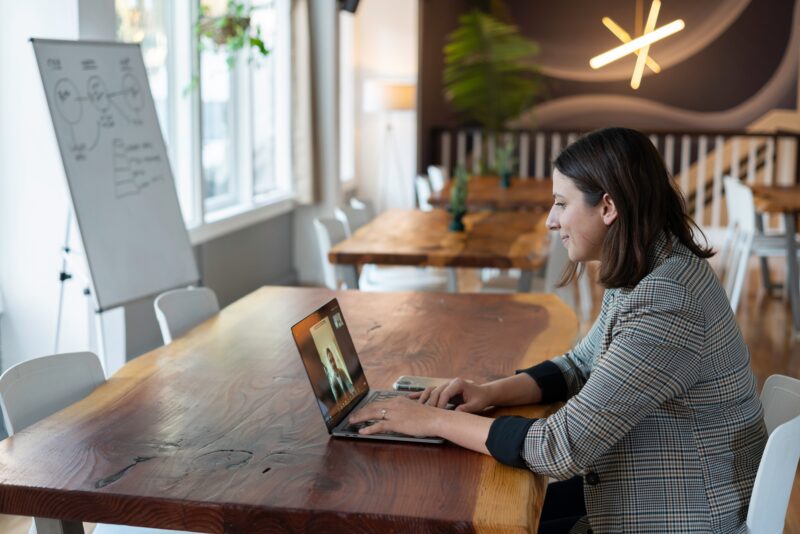Opinion
Listen to your partners
To support Israel right now, tap into deep relationships
Each week, before Shabbat begins, my husband and I gather at our dinner table with our two young children. Before we light the candles and chant the blessings, we take out our tzedakah boxes and hand each child several coins. Often, our older child will reflect on where he wants to make a donation when the tzedakah box is full. Last week, he said to me, “I just want to help people live in peace.”
My son’s prayer reminds me of Hillel’s wise teaching: “the more tzedakah, the more peace” (Pirkei Avot 2:7). With Israel at war, the most important way that those of us in North America can work toward peace and safety for all is to send needed resources to our partners in Israel.

Illustrative. Woman on a Zoom call. Photo by LinkedIn Sales Solutions on Unsplash
As the news of the surprise attack on Oct. 7 hit my inbox, I knew as the leader of a legacy Jewish women’s organization that we needed to mobilize our network. In coordination with the broader Reform movement, we directed our membership to donate to Jewish Federations of North America’s emergency fund as an initial response. We participated in this collective donation to ensure the largest, coordinated impact for those in need on the ground in Israel.
I commend the broad JFNA fundraising effort, which had already raised over $388 million as of last week. But as the war continues, my members, friends and loved ones keep asking the same question: What can we do now?
One of my first calls following the initial shock of Hamas’ attack was to our partners at the Israel Movement for Progressive Judaism (IMPJ). Because of our long-standing relationship, I was able to act quickly and responsibly while listening for what they really needed. I approached my call with our partner with no assumptions. I was calling with a willingness to learn and a commitment to making a difference.
As a grant-making body with strategic, long-term partnerships with progressive and feminist organizations, I knew to turn to these relationships. Fundraising can be both broad-based and targeted. For targeted appeals, relationships are at the foundation. Relationships take the guessing out of problem-solving from a distance, often catching the nuances that may have otherwise been lost. Through the strength of relationships, in addition to asking good questions and responding to specific and potentially unmet needs, we can make the biggest difference.
Since 1913, Women of Reform Judaism has been the philanthropic engine of the Reform movement, in North America, Israel and throughout the world. The YES Fund, WRJ’s primary philanthropic body, was established in 1955; YES stood for Youth, Education and Sisterhood, and the fund initially focused on rabbinic student scholarships. Since then, the YES Fund has raised millions of dollars for an extensive array of projects including supporting Women of the Wall’s (WOW) Israeli high school feminism programming; helping to fund Leo Baeck School’s Arab-Jewish summer camp; founding the North American Federation of Temple Youth (NFTY); and aiding in creating the first Union for Reform Judaism (URJ) summer camp. Most recently, we allocated money from the YES Fund to advance the work of organizations in the Jewish space focused on diversity, equity and inclusion. Our devotion to the vitality of the Jewish State, with grant allocations made specifically to support our partners in Israel working to spread feminism, equality and social justice values within the region, is intertwined in our work.
After speaking with IMPJ, WRJ made an emergency allocation of $20,000 to our partner. We designated $10,000 for their Keren b’Kavod Humanitarian Fund, which will help relocate families currently living along the Gazan border who do not qualify for state-based assistance. An additional $10,000 will be allocated for IMPJ purposes, including efforts related to rabbinic needs and women’s empowerment circles. This allocation will go toward supporting clergy when they are in demand: for instance, due to the tragic spike in funerals within Israel, there is a desperate need for non-Orthodox rabbis to perform funeral services. In addition, it will support women’s empowerment circles that aid families whose spouses or parents are currently missing, captive or serving as part of the reserves.
When my president and I approached our executive committee about the emergency allocation, they voted immediately in enthusiastic unison. I spoke with our grantee, heard their needs and found a way to support them in a way that reaches those who need assistance now.
Although this was our first emergency allocation for Israel in this time of need, it most likely will not be our last. As those kidnapped remain in captivity, as a cease-fire seems out of reach and as this war continues, we will remain in contact with our grantees to help them address their changing needs.
What can you do now? Support broad-based efforts while looking to organizations with deep relationships that predate this conflict. Help us best listen to our partners and continue to support efforts in doing so.
As I gather with my family this upcoming Shabbat, and every week to come as this war persists, I will share a blessing for the State of Israel and a blessing for peace for all people. May we soon wake up to a world where our contributions bring an end to this conflict. We will try to live by Hillel’s words: the more tzedakah, the more peace.
Rabbi Liz P.G. Hirsch is the executive director of Women of Reform Judaism, the women’s affiliate of the Union for Reform Judaism.












